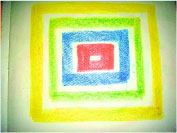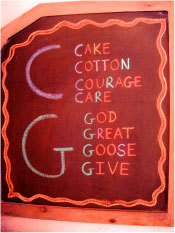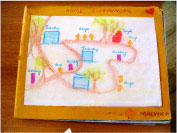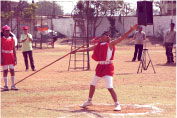
As students continue their journey, they are exposed to - basic academic concepts like addition and reading through storytelling, painting and music. Their days are filled with re-enactments of history, creation of music and other hands-on activities that help them grasp each concept - not memorize it.
First Grade
These children enter the grades surrounded by beauty and immersed in wonder, music, and movement. Writing of letters and reading is introduced as an evolutionary process. Letters and the sounds they make are a gift of nature and this is discovered through stories and drawings of the images from the story. Through imaginative and tactile means, students are introduced to the four processes in math. Fairy tales and nature stories awaken the child's interest in the world. Choral recitation and flute-playing are essential to the first-grade experience; students begin handwork and Indian languages – Hindi & Marathi. Grade one as part of their development visit the National Park to experience the rhythm of the seasons observed through the senses.
Second Grade
The teacher stays with the class from the first to the third grade, and continues with them to the sixth grade whenever possible. This continuity of class and teacher allows for a learning community with a strong foundation. The second-grader meets a language curriculum rich in contrast between the lives of the saints and fables. Basic arithmetic operations are expanded and multiplication facts are learned through rhythm and movement. The children's artistic work includes painting, drawing, and modelling.
Third Grade
Physical growth accelerates during this period as also the child is growing into a new awareness of self. The child's relation to the world changes; study now has a more realistic, practical character. Lessons include learning how different walks of life mutually support one another, as on a farm where students concretely experience working with animals and growing crop and vegetables. As part of their Farming block they make 3 trips to a farm where from sowing to reaping and later consuming the food they have grown, is all done by the students. Third-graders study shelter and house-building. All teaching is done through the teacher's spoken word and the child's direct experience. Math becomes practical: measuring, cooking, telling time, and using money. Stories, which may parallel the children's own inner journeys, are heard, written, and illustrated. Students continue to play the diatonic flute or recorder.
Fourth Grade
Constantly in motion and seeking boundaries, the fourth-grader is met with a rich curriculum including a study of one's physical place on the earth, through local history and geography; the human relationship to the animal world, through zoology; and the work of good and evil, through Norse mythology and stories from Mahabharat. They take a critical step forward in math--the breaking of the whole--fractions--laying a foundation for higher math and abstract thinking skills. In music, the child's strengthening individuality allows each to hold his or her own in part-singing canons and rounds. Brain hemisphere integration is enhanced and listening skills honed when the entire class comes together in singing and playing the recorder in rounds. The students visit all the important sites in Mumbai as part of their Home Surrounding block.
Fifth Grade
Students continue their rich experience with language and visual arts as they move from myth into history through study of ancient civilizations, from India through Greece. This study, brought through stories, poetry, and songs stirs the child to a more intense experience of their own human-ness. Inquiry into geography of India and botany bring the child into a recognition of change and metamorphosis. Geometry is explored through free-hand rhythmic drawings. Decimal and fractions continue their exploration of part and whole. Students begin woodwork which grows from their study of trees in botany. Along with the fifth graders of other Steiner Schools in India fifth grade students of Tridha compete in the annual Greek Olympic Games.
Sixth Grade
Sixth-graders enter a time when the inner light of reason and the outer world of sense-perceptions become central to their experience. This is mirrored in the study of history from the Vedic period to ancient Rome through the Middle Ages; deepened and developed through business math and geometry; and integrate in their being through studies in physics and mineralogy. Their skills in reading, writing, spelling, composition, and grammar is woven holistically throughout the curriculum. Our Grade Six students also learn mineralogy and visit mines and Mineral museums to learn about the different stones. They themselves mine and bring back many precious pieces of stones.








